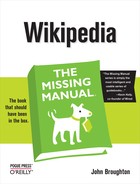The first part of this chapter focused on ways to decrease the probability of getting into a content dispute. But if you’re editing articles, such disputes are almost inevitable, unless no one else cares enough to edit the same articles. This section shows you what to do if someone disputes one of your edits, or disagrees with how you responded to one of his edits. When you’re in a content dispute, your goal should be to resolve the matter informally. You usually try to reach an informal resolution by discussing the matter on the article talk page, as discussed on Article Talk (Discussion) Pages.
With any luck, both you and the other editors who get involved in the discussion about content are reasonable, respectful of the other editors (who are also unpaid volunteers), and focused solely on what’s best for Wikipedia. Taking that approach improves the chances of a successful outcome. If you find yourself disagreeing with another editor about content, start with the following suggestions. You’ll be much less likely to need to use more formal methods to resolve matters.
“Discuss Edits, Not Editors” (Discuss Edits, Not Editors) stressed the importance of avoiding incivility, and assuming good faith. Those objectives hold even more true once a dispute is underway. Don’t make disagreements a personal matter if you want to easily resolve content disagreements.
Remember that your goal is improve an article, not to win an argument. As the guideline Wikipedia:Etiquette (shortcut: WP:EQ) puts it, “Concede a point when you have no response to it, or admit when you disagree based on intuition or taste.” Ski instructors tell new students, “If you’re not falling, you’re not learning.” In Wikipedia, when you edit articles, you should consider your errors (when pointed out) as an indication that you’re learning. There’s absolutely nothing wrong if your changes to an article weren’t perfect. What’s absolutely wrong is defending something because you did it and another editor didn’t like it, and you think that somehow you have to defend the edit simply because it’s yours.
An example of a compromise, where information posted by another editor seems plausible and there’s no problem with wording, is to put a “citation needed” template (like {{fact | date=August 2008}} into the article, rather than removing the information for lack of a source.
If your goal, even for controversial content, is to get everything that you think belongs in an article into that article, and to have the wording exactly as you want it, then you’re just asking for more arguments. You’re not going to reach those goals without a grinding battle that consumes time much better spent editing (or doing just about anything else). Here are three goals that are far more achievable than getting exactly what you want:
Get enough information into an article so that readers have at least a basic sense of why a topic is interesting and important, and what that topic is.
Keep incorrect information out of an article, so that readers aren’t misled.
Keep good links and sources in an article, so that interested readers can follow the links and read the sources for more information.
Remember also that a bitter, protracted battle over content can play a large part in a decision by an editor to quit Wikipedia. (If you’re not enjoying editing, why do it?) When you know that the other editors involved in a discussion are valuable contributors to Wikipedia, be especially certain that discussion about content is a constructive, pleasant one. By contrast, if you battle over every point and refuse to concede anything, you hurt Wikipedia in many ways.
A very experienced editor once said that the most effective tactic he knew was to post, on a user talk page, the message, “It’s getting late, let’s continue this tomorrow or the day after that.” Waiting a day or two gives everyone’s inner caveman (who always wants to fight back) a chance to settle down. Then you can look at the discussion with better perspective.
In WP:DR, disengagement is the second step in the dispute resolution process. The policy says that the simplest way to resolve a dispute is to simply stop having it. You can just stop editing the article or you can ask another editor to join in, and defer to that editor’s suggestions. Work on other articles instead. By the time you return to the disputed article, it’ll have evolved, other editors will have worked on the problem, and the disagreement may no longer exist.
Disengagement is also good because it gives you a chance to do a reality check. The following two essays may help get you into an effective frame of mind:
